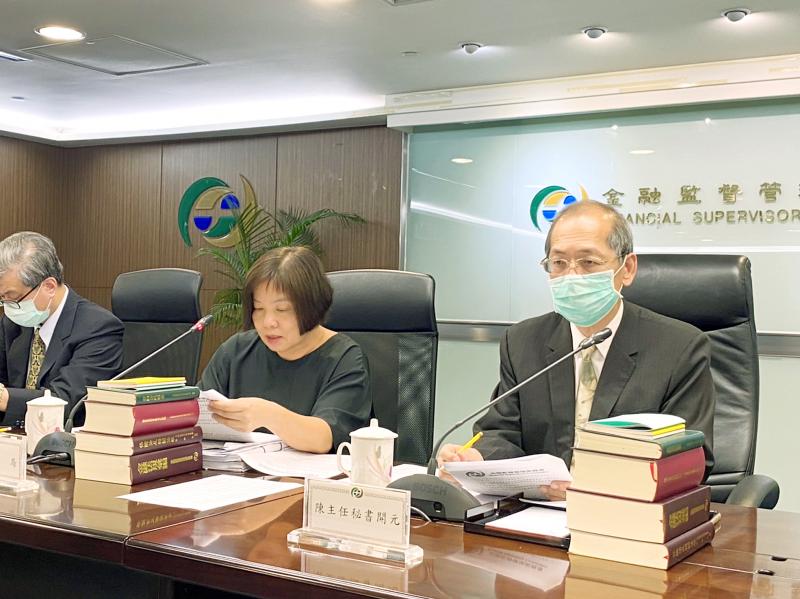The Financial Supervisory Commission (FSC) yesterday fined Shin Kong Life Insurance Co (新光人壽) NT$27.6 million (US$939,415) for a reckless investment that endangered its solvency, and suspended its chairman Eugene Wu (吳東進) for poor supervision.
The penalty is the second-highest in a single case after Nan Shan Life Insurance Co (南山人壽) was fined NT$30 million in September last year and its chairman Du Ying-tzyong (杜英宗) suspended for two years, the commission said.
In three rounds of special and regular examinations conducted since last year, the commission found that Shin Kong Life had given too much power to an asset and liability management committee on investment decisions, without any checks, Insurance Bureau Director-General Shih Chiung-hwa (施瓊華) told a news conference in New Taipei City.

Photo: Kao Shih-ching, Taipei Times
The committee, led by Wu, increased its investment by NT$96.66 billion in several US stocks and exchange-traded funds in two consecutive days in January, ignoring warnings from the insurer’s risk management department, Shih said.
However, as US stocks tumbled, the insurer’s value-at-risk, a measure of the risk of investment loss given market conditions, increased to 43.33 percent by the end of March 27, which was 2.75 times higher than the 15.73 percent limit set by the insurer’s board members, Shih added.
The investment also caused the insurer’s equity-to-asset ratio, a key solvency gauge, to fall to 2.2 percent as of the end of March, below the regulatory minimum of 3 percent, she added.
“Even though the firm’s risk-based capital ratio dropped below the board member’s goal of 250 percent, the committee did not discuss how to improve it. There were no minutes of the committee’s meetings, which indicates poor internal controls,” Shih said.
Wu, who should have ensured the firm’s financial strength and solvency, on the contrary weakened them by allowing the committee not to report to the board of directors and appointing more than half of the committee’s 16 members, so the commission suspended his chairmanship and barred him from becoming a board member until his term ends in June 2023, she said.
“We expect the insurance company to get back on track by overhauling its mechanisms for investment and risk management while Wu is absent,” Shih said.
The commission also dismissed Shin Kong Life vice president and chief investment officer James Yuan (袁宏隆), as he ignored risks by taking on fixed-income stocks with poor liquidity, asking the firm’s research team to revise reports so that the investment team could invest in targets and make at-the-close orders in the local stock market to boost its asset valuations.
The commission said that it has lowered the insurer’s ratio of overseas investment to a total investment of 39 percent, from 43 percent, which means that the firm can only sell its foreign assets and cannot buy any new targets until the ratio drops, it added.
The commission did not set a deadline for Shin Kong Life to trim the ratio, but demanded that it not buy any local or foreign stocks and exchange-traded funds before the adjustment is completed, Shih said.

Taiwan’s long-term economic competitiveness will hinge not only on national champions like Taiwan Semiconductor Manufacturing Co. (TSMC, 台積電) but also on the widespread adoption of artificial intelligence (AI) and other emerging technologies, a US-based scholar has said. At a lecture in Taipei on Tuesday, Jeffrey Ding, assistant professor of political science at the George Washington University and author of "Technology and the Rise of Great Powers," argued that historical experience shows that general-purpose technologies (GPTs) — such as electricity, computers and now AI — shape long-term economic advantages through their diffusion across the broader economy. "What really matters is not who pioneers

In a high-security Shenzhen laboratory, Chinese scientists have built what Washington has spent years trying to prevent: a prototype of a machine capable of producing the cutting-edge semiconductor chips that power artificial intelligence (AI), smartphones and weapons central to Western military dominance, Reuters has learned. Completed early this year and undergoing testing, the prototype fills nearly an entire factory floor. It was built by a team of former engineers from Dutch semiconductor giant ASML who reverse-engineered the company’s extreme ultraviolet lithography (EUV) machines, according to two people with knowledge of the project. EUV machines sit at the heart of a technological Cold

TAIWAN VALUE CHAIN: Foxtron is to fully own Luxgen following the transaction and it plans to launch a new electric model, the Foxtron Bria, in Taiwan next year Yulon Motor Co (裕隆汽車) yesterday said that its board of directors approved the disposal of its electric vehicle (EV) unit, Luxgen Motor Co (納智捷汽車), to Foxtron Vehicle Technologies Co (鴻華先進) for NT$787.6 million (US$24.98 million). Foxtron, a half-half joint venture between Yulon affiliate Hua-Chuang Automobile Information Technical Center Co (華創車電) and Hon Hai Precision Industry Co (鴻海精密), expects to wrap up the deal in the first quarter of next year. Foxtron would fully own Luxgen following the transaction, including five car distributing companies, outlets and all employees. The deal is subject to the approval of the Fair Trade Commission, Foxtron said. “Foxtron will be

INFLATION CONSIDERATION: The BOJ governor said that it would ‘keep making appropriate decisions’ and would adjust depending on the economy and prices The Bank of Japan (BOJ) yesterday raised its benchmark interest rate to the highest in 30 years and said more increases are in the pipeline if conditions allow, in a sign of growing conviction that it can attain the stable inflation target it has pursued for more than a decade. Bank of Japan Governor Kazuo Ueda’s policy board increased the rate by 0.2 percentage points to 0.75 percent, in a unanimous decision, the bank said in a statement. The central bank cited the rising likelihood of its economic outlook being realized. The rate change was expected by all 50 economists surveyed by Bloomberg. The